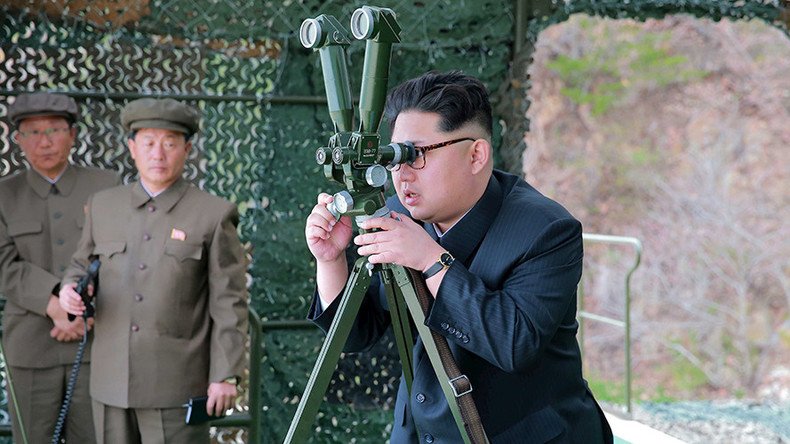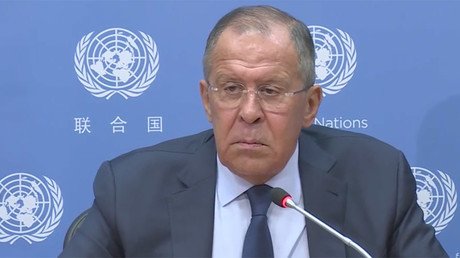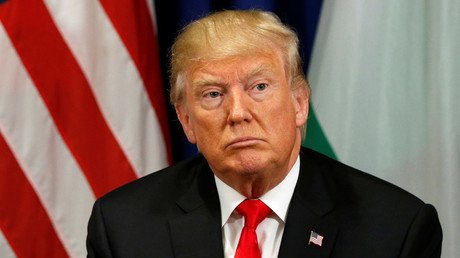N. Korea has already suffered untold devastation by US, knows ‘fire & fury’ firsthand - analysts

Trump threatened violence against North Korea 'like the world has never seen,' but the country has lived under an existential threat from the US since the middle of 20th century, says Christine Hong, professor at the University of California in Santa Cruz.
Russian Foreign Minister Sergey Lavrov, while addressing a media briefing during the UN General Assembly in New York on Friday, urged the United States and North Korea to end their sabre-rattling and establish dialogue.
RT spoke to Christine Hong, East Asian studies professor at the University of California in Santa Cruz, and Gregory Elich, board member of the Korea Policy Institute, to discuss the issue.
RT: The Russian foreign minister described the ongoing threats between Trump and Kim Jong-un as a kindergarten fight. Is that a fair assessment?
Christine Hong: I would never frame it in those terms because that suggests some sort of equivalent between the two parties. In point of fact, the US has threatened North Korea with total annihilation, not just with Trump, but going back to North Korea’s very inception in the middle of 20th century. North Korea has literally lived, survived and existed under an existential threat from the US this entire time. The language that we are hearing, however much it may seem tit-for-tat, is not at all equivalent if you look at the history. When Trump speaks about visiting “fire and fury upon North Korea like the world has never seen” – he is speaking to a country that has known untold devastation at the hands of the US. By contrast, the US has never experienced anything commensurate to that unless you wanted to think about the indigenous peoples of the Americas. The language is not tit-for-tat…
North Korea has proposed the very reasonable offer of suspending its nuclear tests if the United States and South Korea suspend their war games that simulate the invasion and occupation of North Korea, the “decapitation” of its leadership, and a nuclear first-strike against North Korea.
RT: Russia and China called for a "double freeze" initiative (meaning the US and South Korea would stop military drills, and North Korea would stop its nuclear tests). The US rejected that plan. What do you see as a viable solution?
CH: The question that is urgent for us is whether or not Donald Trump, his administration has been in total chaos, he actually intends to make good on his genocidal language of wiping out all of North Korea. The stakes are actually that high. And right now Moon Jae-in in the South has proven to be extremely ineffectual in carrying forward what he was elected to do, which was to usher in peace to the Korean peninsula…
We must remember once again that, according to Chinese statistics, an estimated 30 percent of the North Korean population was killed, 70 percent of whom were civilians. The United States waged an absolutely unrestrained air war. So when Trump speaks about “fire and fury” North Korea understands intimately what that means. By contrast, when Trump is stating this, this is a man who dodged military service during the Vietnam War era, he likes to thump his chest and he thinks it makes him sound tough, like the biggest bully in the schoolyard. From the North Korean perspective, those words are tied to a devastating and intimate history of ruin at the hands of the United States.
Escalating N. Korea crisis: Who is the ‘evil menace’? https://t.co/Ec68bAnO5U, https://t.co/jREYFwhkht
— RT (@RT_com) September 22, 2017
‘Real story behind war of words: US wants to drive N. Korea into economic submission’
RT: The Russian foreign minister accused Trump and Kim Jong-un of behaving like children in a kindergarten fight. Is there any truth to that?
Gregory Elich: The language is not helpful at all. I am particularly worried about the fact that Trump reacts in an emotional matter and that may cause him to make harsh reaction than he might otherwise have taken. The real story is not the war of words, but the actual actions that Trump administration is taking. In addition to the UN sanctions that have just been passed, which eliminate 90 percent of North Korea’s export earnings, the Trump administration has issued executive order that basically bans all financial institutions throughout the world from access to the US financial system if they do normal trade and normal transactions with North Korea. And the Trump administration is also sending officials throughout the world visiting countries and pressuring them to sever relations with North Korea and that is already been happening in several vases. It is an attempt to build a total blockade against North Korea and drive it into economic submission. I think that is the real story, more than the war of words.
RT: The US rejected “double freeze" initiative endorsed by Russia and China. Why do you think the US did that?
GE: The US is not interested in negotiations. The Trump administration believes that they can bludgeon North Korea into submission without giving anything in return. It is completely closed off any openness to diplomacy whatsoever. I think it is a mistaken policy because North Korea has always responded in a diplomatic matter when they are approached in a diplomatic matter. But whenever they are pushed, pressured or threatened, they push back. If the goal is actually to de-nuclearize North Korea, then threatening and pressuring it on this war of words is exactly the opposite approach to what would achieve that goal.
In May, North Korea contacted US officials and suggested that they were willing to cease all nuclear testing and all missile tests if the US would drop its hostile policy and drop the US sanctions and sign a peace treaty. The Trump administration may or may not have liked those conditions, but it could have suggested alternate conditions. It was an open door to diplomacy at that point of time and the Trump administration said ‘no’.














